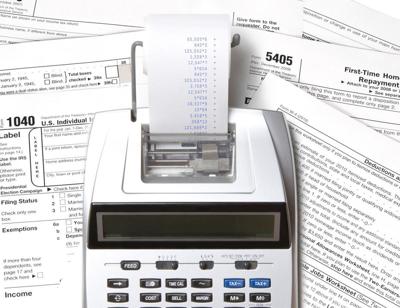Wisconsin is inching closer to repealing an obscure tax that has been modified by so many carve-outs that several lawmakers compared it to “Swiss cheese” during a committee hearing on Tuesday.
“No legislator of either party would cast a vote to impose a personal property tax in its current form,” said Sen. Duey Stroebel, R-Cedarburg, a co-author of a legislative proposal to repeal the tax, in testimony to the state Senate’s Committee on Universities and Revenue.
The personal property tax was implemented in the 1830s, before Wisconsin became a state, as a means of funding the territorial government. At the time, Wisconsin had no income or sales tax — so it relied on property taxes.
It has come to be seen as an unnecessary burden on business owners, who pay a sales tax when they buy an item and continue to pay the personal property tax as long as they own it.
Republicans and Democrats alike have supported efforts to eliminate the tax over time, but have succeeded only in chipping away at it with a series of exemptions.
“We've worked hard over the past decade to make Wisconsin a more inviting place for job creators, and our reforms have helped established businesses grow and (helped) new businesses get off the ground,” said bill co-author Rep. Dan Knodl, R-Germantown. “It's time for Wisconsin to expand the reform dividend even further by eliminating the personal property tax.”.
Sen. Brad Pfaff, D-Onalaska, who introduced a repeal bill in 2021, thanked Stroebel and Knodl for their efforts and said he believes the Legislature is “close” to reaching a bipartisan agreement on the proposal.
The latest proposal was written in consultation with the state Department of Revenue, its authors said. DOR Secretary Peter Barca said in testimony that the agency was “pleased” to be part of the process.
“The drafting of this bill has proven challenging, as the personal property tax runs through many chapters of Wisconsin statutes. Our goal is, and has always been, clarity,” Barca said.
Barca said there are several issues the agency would still like to see addressed in legislation — including assurance that local governments will receive state funds to make up for the loss of personal property tax payments. Stroebel said Republicans will include adequate compensation for local governments in their version of the 2023-25 state budget.
That’s been estimated to be somewhere between $200 million and $300 million, based on previous proposals.
According to a 2016 analysis by the Wisconsin Taxpayers Alliance (now the Wisconsin Policy Forum), personal property has accounted for between 2.2% and 2.6% of the state’s property tax base since 2005.
In a 2017 interview with the Cap Times, longtime tax policy analyst (and then-Wisconsin Taxpayers Alliance president) Todd Berry said the tax has remained on the books for so long — despite a bipartisan desire to get rid of it — because it has competed with other priorities.
“The problem is, it’s never anybody’s top priority for tax cuts, because it’s not sexy,” Berry said in the 2017 interview. “The sticking point simply is if you get rid of it you’ve got to come up with several hundred million dollars of money so that local governments are made whole, so they don’t lose revenue. And of course there are always other, better things to do.”
The personal property tax began as a tax on items like livestock, furniture, jewelry and vehicles. Its property tax counterpart — real property — covers land and buildings.
Even in its earliest days, the tax raised questions about fairness, as high-income earners were more likely to have assets like jewelry that they could hide from assessors, while lower-income earners and farmers were more likely to have more visible property subject to taxation. Determining the value of some personal property, especially over time, was also a challenge.
"The dual challenges of locating and valuing personal property were two of the reasons most personal property was removed from taxation during 1830-2000," according to the 2016 Taxpayers Alliance report.
Over the last 180 years, more and more exemptions have been carved out of the tax, including clothing, personal libraries, jewelry, musical instruments, motor vehicles, hay, feed, grain, manufacturing machinery and equipment, business computers, fax machines and cash registers.
Most recently, a portion of the tax covering machinery, tools and patterns not used for manufacturing was eliminated in the 2017-19 budget under former Gov. Scott Walker.
“After nearly two centuries worth of exemptions, the personal property tax now looks like Swiss cheese and is entirely unfair and unconstitutional,” said Michelle Kussow, founding member of the Coalition to Repeal Wisconsin’s Personal Property Tax and executive vice president of the Wisconsin Grocers Association.
Keith Trafton, CEO and managing partner of the Milwaukee-based Bartolotta Restaurants, said the company pays about $40,000 per year on the personal property tax.
“We'd love to use their money in different ways, whether it's investing in equipment — the people are the key part of our businesses, so compensation (and) training for our staff, is certainly something we would apply those dollars towards,” Trafton said. “Our industry runs on very thin margins, and the last couple of years have certainly not helped that.”
More than 50 groups are registered to lobby in favor of the proposal, including the Wisconsin Restaurant Association, the Wisconsin Hotel and Lodging Association, the Wisconsin Association of Meat Processing, the Tavern League of Wisconsin and the Dairy Business Association. A handful, including the Wisconsin Counties Association, are registered as neutral. The League of Wisconsin Municipalities is registered to lobby against the bill, with a note that “a hold harmless aid payment” for municipalities would be required to avoid a property tax shift.
A spokesperson for Gov. Tony Evers directed questions to DOR, but noted that the governor has repeatedly voiced support for repealing the tax, including proposing its elimination in his most recent budget proposal.






